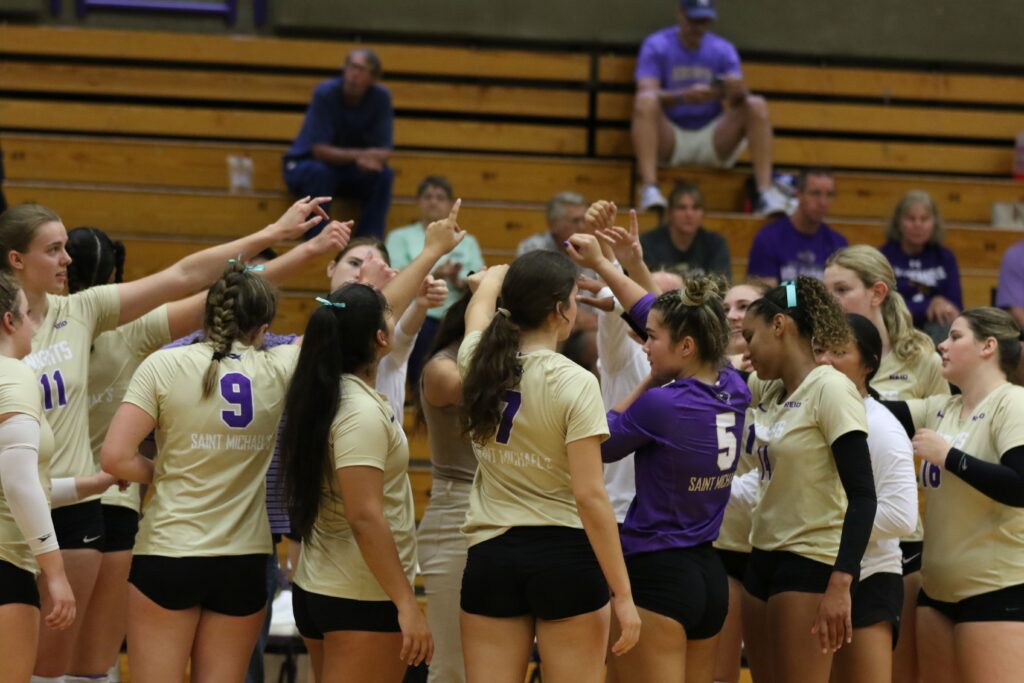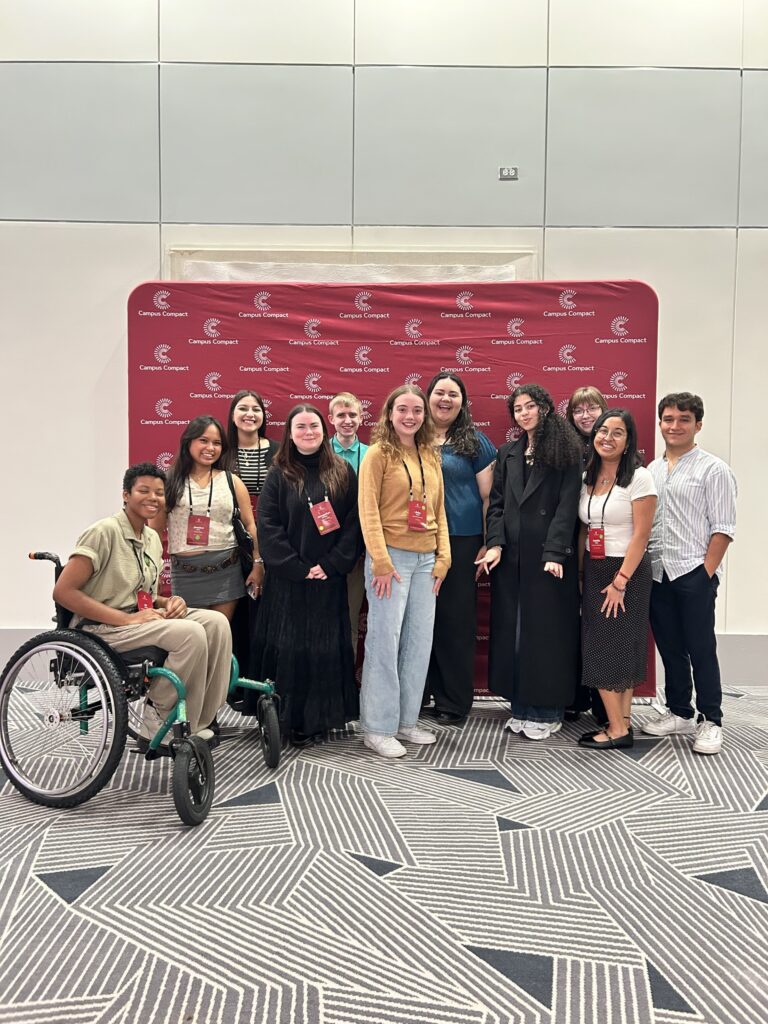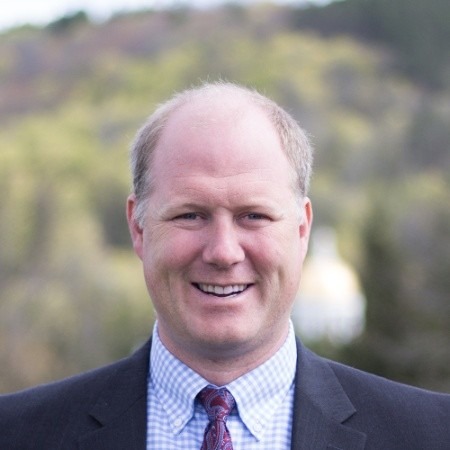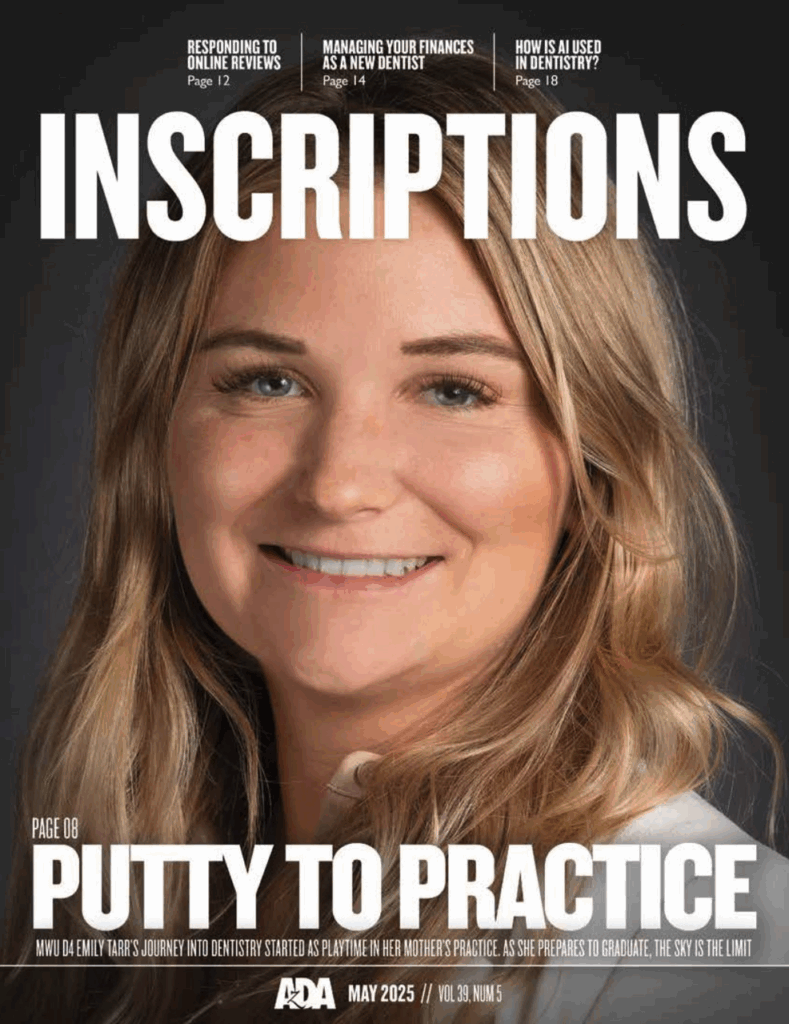Mastering the mental game: Women’s Volleyball embraces positive mental health in competition
The first ever full-time Women’s Volleyball coach in Saint Michael’s College program history has taken an unprecedented approach to team culture – specifically regarding mental health – since signing on earlier this year.

Women’s Volleyball Coach Lauren Brough during a volleyball game in fall 2023. (Photo by Jim Laskarzewski)
Coach Lauren Brough is challenging her athletes to hold their mental skills to the same merit as physical skills both in and out of competition. But what started as a way to break a recent trend of losing seasons is also becoming an essential skill for players both on and off the court.
“I decided to make mental skills a priority in our program because it felt like we had all the right pieces as a team and I had to really search for explanations as to why we couldn’t pull out games that we were really close in, to really change our spot in the conference,” Brough said. “After talking with a really skilled, local clinical psychologist, she explained to me that there’s so much more that’s going on within team dynamics.”
Junior captain and starting setter Alexandra Báez Rentas ‘25 agrees with this new approach.

Starting setter Alexandra Báez Rentas ‘25 jumps to hit the volleyball during a Fall 2023 Women’s Volleyball game. (Photo by Jim Laskarzewski)
“I think [mental health is] often overlooked, especially in volleyball, even though the game is 90% mental,” Báez Rentas said. “But to me, if you can’t excel at the mental side of the game, then you can’t perform at the highest level.”
Despite her current commitment to Brough’s new standards, Báez Rentas admitted that she did not always buy into the mental side of sports.
“Mental health is a buzzword that people just throw around without really knowing what it is, myself included,” she said. “They just think it’s positive self-talk, but it’s so much more than that.”
She added, “Until this season I’d always assumed it wasn’t something I really needed to work on. I thought that mastering the technical-side of the game was enough. Mental health in sports when I was growing up just wasn’t normalized.”
Embracing gratitude and intentions
According to Brough, Báez Rentas’ experience as a young athlete is exactly what she hopes to remedy.
“I want it to be different in the sense that people feel valued, and that their thoughts and feelings matter, that they’re not something that needs to be ignored,” Brough said. “You have these gut instinctual feelings that come up when you play, and I think in sports a lot of times we’re taught to just cast these aside. But I don’t think it’s the emotions that are the problem, it’s more how you respond to them.”
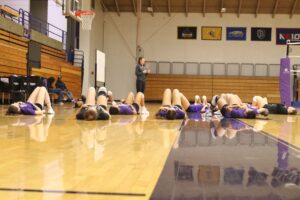
Women’s Volleyball players, led by Coach Lauren Brough (standing) go through mental regulation exercises during the 2023 preseason. (Photo by Jim Laskarzewski)
Given this belief, Brough has made mental skills and regulation a priority within her team. Every day, she asks her athletes to share their “gratitudes and intentions” with each other before each practice.
Before even touching a ball, the athletes must all take a moment to share one thing they are grateful for in addition to one thing that they plan to focus on. After “G’s and I’s,” as Brough calls them, she then asks the athletes to complete their daily mental regulation, where each player finds a spot on the floor, closes their eyes, breathes, and visualizes.
On game days, Brough conducts a similar practice. Towards the beginning of the allotted warm up time, she brings her athletes off the court to a quiet part of the facility. There, they complete a mental regulation, similar to those in practice, placing the team in the right mindset for the game ahead.
Throughout the game itself, especially in moments of adversity, Brough asks her athletes to continue to use the mental tools they have learned, whether it be breathing, visualization, winking at a teammate, or finding something blue in the stands – anything to prevent their fear and self-criticism from spiraling.
Mandatory weekly “mini-meetings” and occasional team chats with a local clinical psychologist – other changes Brough implemented – help ensure that each athlete is equipped with the mental skills necessary to help them remain balanced and perform mentally and physically at peak condition.
More than just buzzwords
Through the extensive mental work that the team has put in so far this season, Báez Rentas said she has already seen a tangible difference both personally and as a team.
“I feel more free and more confident,” she said. “I enjoy the game so much more because I don’t put the same amount of pressure on myself like I used to.”

Women’s Volleyball players huddle during a fall 2023 game, chanting, “Knights on three, family on six!” (Photo by Jim Laskarzewski)
“And I think our team is learning how to trust each other more and to be more vulnerable,” she added. “We are more connected with each other than we ever have been before, we feel more united. I mean, it’s even to the point that we say it in our cheer any time we step onto the court, ‘knights on three, family on six.’ And we mean that. We truly are a family this season.”
Brough said she hopes other teams consider this type of training since it seems to provide a better experience for student athletes overall and helps “create more happiness and joy around the student experience.”
“I think that if you’re a coach, or if you’re an athlete, and you’re not considering your overall mental health, or if you’re not considering mental strength, it’s limiting you,” Brough said.
Off the court, Brough believes that these new mental skills will help her athletes as students, community members, and future professionals. It’s essential to develop self-awareness and mental skills to regulate emotions, which in turn will improve interpersonal relationships across all settings, Brough said.
“It’s not just buzzwords flying around; there’s a lot of vulnerability involved in the culture that we’re building,” Brough said. “That vulnerability is meant to build connection and build community. So to me, that’s much deeper than just saying ‘we support each other.’ Instead, the behaviors that we outline are actually proving that that’s the case, that you have people behind you every step of the way.”

For all press inquiries contact Elizabeth Murray, Associate Director of Communications at Saint Michael's College.
